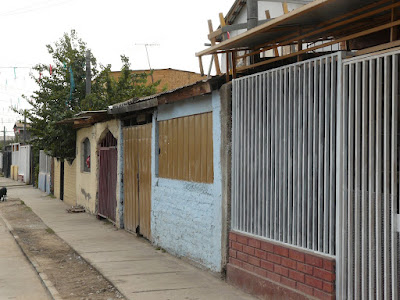The day of the game, April 25, began with a lot of excitement and anticipation (and, yes, I confess -- some fear, on my part).
In sticking with our "stay safe" strategy, however, we planned to leave for Monumental Stadium -- about 45 minutes away -- at around 1:45 since the game was scheduled for 3:30. At around 12:30 however we began hearing crowds of fans chanting as they moved through the streets and on their way to the game, so at 1 p.m. we headed for the metro ourselves.
Our first indication this was obviously no insignificant match came at the metro station itself, where dozens of police officers were already monitoring the crowds:
When the train arrived, it was already full (uncommon for a Sunday), but we managed to squeeze in one of cars. A crowd of about a dozen young men aged from about 14 to late 20s, were chanting for Colo-Colo. They also
jumped every few minutes, bouncing the metro car up and down as it moved through the tracks. I worried momentarily about what this could do to the moving train, but, the metro just moved along.
At our destination, we made our way out of the metro station and towards the stadium with hundreds of others. Lots of police, some in full riot gear, met us at every step:
After being searched at the door, we were finally in the stadium which was already half full, before 2 p.m. We then discovered this was Colo-Colo's stadium and as such, most of its seating was assigned to fans of this team (the white and black). The U de Chile (the blue and red) had been given a tiny cheering section, across from where we were:
Feeling safe, the kids donned their Colo-Colo gear:
The stadium soon filled with chanting, cheering fans, and the game began, with police first escorting the U de Chile players and the referees out onto the field:
It took a while for a team to score, but when one of Colo-Colo's star players, Argentinian Ezequiel Miralles, scored that first (and turns out, only) goal of the game, the crowd went wild(er):
Other than a lot chanting, taunting and swearing, the game's first period went without a hitch, even when Miralles was thrown out of the game, in the 38th minute of play, for apparently trying to injure a blue and red player:
Trouble actually started at the half time intermission, when fans in a section to our left, began throwing rocks at the riot police, and police responded in kind. At the time, Fernando and Nick had gone to get drinks and snacks so they got a good view of what was going on (safely, from the other side of a fence).
We learned hours later, through the news, that what had caused the minor riot was the death, a couple of hours earlier, of a Colo-Colo fan on his way to the game. The papers reported that the fan -- a 33-year-old man -- got in front of, and started taunting, one of the water-throwing trucks brought to the game (and often used to disperse rioting crowds). Apparently, the fan had slipped and fallen in front of the truck, which had then been unable to stop and had ran him over. We actually got a picture of one such truck, on our way to the stadium:
We also learned later that 19 people had been arrested during the stadium skirmish with the police.
Unable to join Carmen and me at our seats after the intermission, Fernando and Nick watched most of the score-less second period from the snack bar area. Since we'd agreed to leave 15 minutes before the game ended, Carmen and I made our way out of the stands and joined them there.
Only a handful of others were leaving at that time, but as Fernando had predicted, although the trains were running, the actual metro stations close to the stadium had shut their doors so you could not get on the subway.
As planned, we walked to a main intersection and hauled a taxi, which hesitated for a second to pick us up. I guess the driver figured if we had kids, we weren't going to trash his vehicle. Half an hour later, we were safely back at our apartment, still pumped from the excitement of the game, and happy that we'd made it home alright, after all.
Fernando, however, had a confession to make. He is actually a fan of... U de Chile!, and while the kids and I had been cheering our hearts out for the white and black, he'd been secretly clapping for the blue and red and was disappointed they'd not played better.
"Oh, the sacrifices you have to make....." he deadpanned.
Here are some more pics of the game:
Yes, there were other kids (and some women) at the game, but not many....
Carmen wearing her true colours.
Colo-Colo -- all the way!!
Also, here is some info on the two top-ranked Chilean teams:
And Universidad de Chile:






































